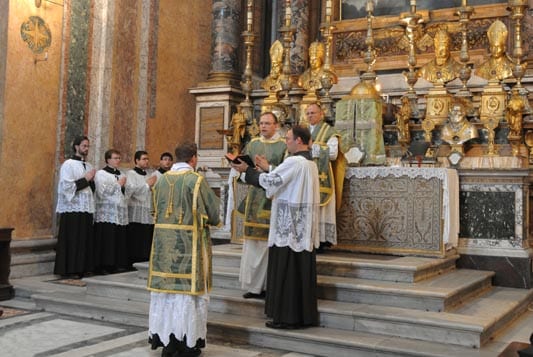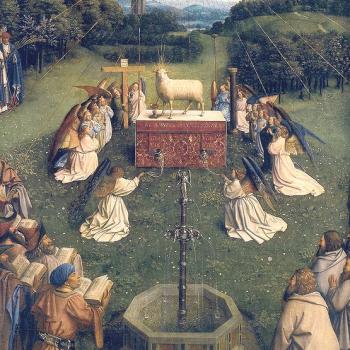
The argument is made (and it may very well be true) that having altar girls causes boys to have less desire to be altar boys and priests. I reply to that, taking it (I think) to a somewhat deeper level of analysis.
***
[See, for example, the article, What Altar Boys Can Do That Altar Girls Can’t, and my own previous post, Altar Girls: Pro and Con]
***
The article makes a good point, but it’s true that it does not become an argument against altar girls, only for altar boys as a possible step to the priesthood.
I have maintained that if one has a call, it won’t be thwarted by merely being an altar boy or not. If a boy feels led to be an altar server, he will do it whether there are girls or not. A call is far deeper than mere external, circumstantial elements. If we think it depends on those, I don’t think we are grasping what a vocation is in he first place.
I had a calling to be an apologist. I know the year that it happened: 1981. There was no question about it in my mind (only in the mind of some other people who never understood it). Nothing has ever stopped me from trying to fulfill it. If something that was the equivalent of an altar girl had stopped my vocation, then I would have to question whether it was genuine or not.
The numbers of priests continue to increase, and that is simultaneous with a wide use of altar girls, so I don’t see that one thing is hindering the other.
Another point I would make is that priests will need to learn how to interact with women and girls. It’s not an all-male culture (being in a monastery is that). A parish priest has to work with all sorts of people: half of whom (often more than half) are women. So it seems to me helpful that future priests start young and learn to interact with girls. It may be awkward (I know: I went through that) but not impossible.
Nor is being an altar boy required to be a priest or a good Catholic. None of my three boys ever had a desire to serve the altar, and we didn’t force them. You can’t create a deep-seated desire. It either is there or it isn’t.
But all three of my boys are rock-solid Catholics: orthodox, moral, loving to serve (soup kitchens, mission trips, teaching catechism to younger kids and their peers, etc.). Two of my sons want to be a youth minister, and all three have worked with younger people in church settings.
Should we make our kids serve? Sometimes; maybe so. With our children, they have done it (in a larger sense) on their own without us requiring them to do so. And that is because (in part) we have taught them the general principle of serving others out of love.
If my sons had wanted to be altar boys and said, “I don’t wanna do it because there are yucky girls up there,” they would have been soundly and roundly rebuked. That would have been a moment to teach them proper priorities (serving God in a way that one feels called to as more important than being socially awkward about girls).
I don’t deny that younger boys are awkward around girls. I was that age once. That’s a real thing; but it is not insurmountable. That’s my point. If they truly want to serve and feel called to that and possibly to the priesthood, the mere fact that girls are altar servers should not be any sort of hindrance. In the seriousness of their thinking, the boys who feel called will already be well beyond that.
As usual, I am in the middle: seeing good points given by both sides. That’s what good dialogue is: it’s not a slam-dunk one way or the other.
One person argued that when parishes went to all-male altar servers, the total numbers jumped way up (he gives data for seven parishes).
I think good arguments against altar girls could possibly / conceivably be made based on arguments for all-male and all-female schools. But I would still say that a vocation to the priesthood would trump concerns about being around girls; and that a parish priest will have to learn to be around, and interact with females anyway, so why not start early on to do that?
I think it trivializes the very notion of a true calling or vocation, to argue that it would be overcome by a mere altar girl, as if girls are some kind of alien or something.
Our experience as parents has not led us to believe that relatively more separation of boys and girls is good or necessary. For heaven’s sake, most boys have sisters, don’t they? They can’t separate from them. In learning to get along with a sibling of the opposite sex, young children learn about getting along with the other gender.
Being a parish priest is not a “manly environment”. It’s a mixed environment. Being a monk is a manly environment.
A “weak vocation” is a fascinating topic in and of itself (and good to bring up). It’s tough to follow God wholeheartedly in a vocation when your desire for it is “weak.” I would say that that goes back to devotion, prayer, Bible study, God’s grace, surrounding oneself with serious Catholics and other Christians: becoming stronger in the felt vocation so that you can do it with full heart and will.
You “know that you know” when you are called to something (see 1 Cor 7:17: “let every one lead the life which the Lord has assigned to him, and in which God has called him.”). I never had the slightest thought of ever being a celibate man (as a Protestant).
But when my call to be an apologist came in 1981, I knew that I knew that this was what I had to devote my life to. Even then it was a long, laborious process with twists and turns and stops and things difficult to understand, but I still followed the path and I’m here today.
If vocations had been decreasing, perhaps some of the arguments against altar girls as hindrances to priestly vocations might have some weight, but as it is, even American vocations are increasing, with the presence of large numbers of altar girls. That is the bottom line. It’s tough to establish any direct correlation in the anti-altar girls argument, given those facts.
I think the article should have delved into how many of the 80% of priests who had been altar boys also served with altar girls. Then we would have some statistics directly related to the overall discussion, to mull over.
The “anti”-altar girls argument is from good motivations: the desire to see an increase in priestly vocations. But they are increasing, so, I guess the argument would then be that they would increase even more without altar girls. I don’t think so (I think there are many other variables involved as well), but there is no way to prove that. It’s a hypothetical.
How does one go from:
“I believe [strong inclination; not entirely sure] that God is calling me to be a priest”
to:
“I’m not sure God is calling me anymore”
just because altar girls are serving in one’s parish?
That makes no sense to me. God is either calling a person to be a priest or not. Whether He is (from God’s perspective) has absolutely no relation to extraneous factors such as altar girls, opposition in the family, etc.
If one thinks altar girls are essentially wrong and forbidden, then the problem there is with a saint and pope (Pope John Paul II) allowing it (and Pope Benedict XVI and Pope Francis not forbidding it). The problem is with Church authority; then one has to work through that.
But I don’t see how the question could have any direct bearing on one’s calling to be a priest. As I have said, if that is stopped dead in its tracks because of an altar girl, then I seriously question whether it was ever genuine from the start, or else questions are raised about the resolve of the person who claimed to discern it.
We go through all kinds of things in life and we fail many times and have to try to do better by God’s grace. It’s tough to be a disciple, but vocation comes directly from God, so that would not change. If a person doesn’t follow it, however, I suppose that God in His mercy offers a sort of Plan B for a person to go as far as they can go, for the sake of the kingdom, given their self-limitations of whatever sort.
My opinion on this whole matter rests on my understanding of the nature of a vocation (as one who followed a vocation, leading to my present apostolate). It’s not simply what we feel like doing (on a purely human level), as if it is like choosing to take a trip east or west, or what car to purchase; it is getting in line with God’s ideal plan for one’s life, according to the gifts, abilities and desires (Phil 2:13) that He himself gives us.
“Apprenticeship” (for boys) is a good and valid way to look at it. I’m all for altar boys! The more the merrier. I don’t think, though, that that becomes automatically an argument against altar girls, or altar girls as a cause for someone forsaking a vocation they would have otherwise followed. That goes back to my last three comments.
If a supposed vocation to the priesthood is “stopped” due to altar girls, we can be sure that other factors are in play as well, and that it is not a unilateral causal relationship.
Good grief! I could have easily stopped doing apologetics (my vocation) at least half-a-dozen times over the last 33 years, because of this, that, and the other: opposition, money problems, endless insults, discouragement. It’s discouraging, but does it stop me? Never! Nothing will, by God’s grace; if I continue to follow Him and His will for my life!
A true calling doesn’t turn back from the plow. It’s not optional. it’s not prevented by any power on earth, because it proceeds from God’s power and will in the first place.
Does anyone think that a person who gives up a “vocation” (previously strongly asserted or “suspected”) because altar girls exist, would, for example, be willing to be a martyr for Christ? If that will stop them from following God’s will, what makes anyone think that such a person would voluntarily undergo any serious sacrifices or deprivations for the sake of Christ, up to and including martyrdom?
The analysis of “altar girls prevent altar boys . . .” trivializes the meaning of “vocation” and makes it far more human than what it actually is: from God in origin and goal: from A to Z. We decide to “follow” it. The very language of vocation (discern / follow) presupposes that it is something outside of us (from God). Therefore, it could never be “taken down” by external or circumstantial factors.
Whoever God decides to call, they will be called. God knows who will follow His plans and who won’t, and since He is omniscient and omnipotent, is fully able to work around human limitations and disobedience.
I think there are good “anti” arguments to be made. I guess I would say that this is an opportunity to conduct classes about the issue and have boys and girls talk about it. Perhaps with more instruction and communication, it will be seen that it doesn’t have to be “either/or”.
Isn’t life often like that? There are problems, and talking them through helps them. The classes for boys can be all-male, but altar girls would be discussed as a positive thing and not run down, and not presented as a roadblock for priestly discernment.
I’m just thinking out loud. It doesn’t seem impossible to me. It’s like the married priesthood question. If one is absolutely sure that they are called to both marriage and priesthood, then they can become an Eastern Catholic and do both with the blessing of the Church, instead of just complaining endlessly that they can’t do both (in the Latin Rite). It depends on how relatively important a thing is.
My position on this is not rock-solid. I’m basically neutral; leaning slightly in favor of altar girls. What I’m doing here is simply analyzing arguments on both sides (playing Socrates), if I see logical holes in ’em. If I do come down against altar girls (as a purely [permissible] personal opinion, since the Church allows them, but it’s a discipline, not a dogma), it’ll be because of arguments that have to do with fraternity / apprenticeship, etc., rather than on the nature of vocation. I think the latter arguments are not compelling at all.
It’s no doubt true, too, that theological liberals use altar girls as a pretext for female priests, but Pope St. John Paul II made it clear at the same time that there would be no such thing, so they are delusional if they think otherwise.
But just because a liberal may do a thing for nefarious purposes doesn’t make the thing bad in and of itself. The argument is similar regarding communion in the hand. Just because some liberals favored it because for them it indicated less of a “high” (i.e., orthodox) view doesn’t mean that it is of itself intrinsically irreverent. It hardly could be since it was the norm for 6-9 centuries in the early Church, depending on location.
I suspect that Jesus might say if He were here, to a boy reluctant to serve the altar (and possibly later become a priest) because of girls: “you are looking at others; what business is that is yours? I’m looking at you and what is in your heart: will you follow my calling to the priesthood or not?”
Disciplines can change. If even celibate priests could possibly change (just as it came in as a rule in the Latin Rite at some point in history), could not the gender of altar servers change, too, without it necessarily being liberal and some terrible thing?
We didn’t have deacons for a long time. Now we do. Some stuff of that nature can change.
***
(originally 5-19-14)
Photo credit: High Tridentine Mass. Photograph by Lumen roma (June 2008) [Wikimedia Commons / Creative Commons Attribution 3.0 Unported license]
***












